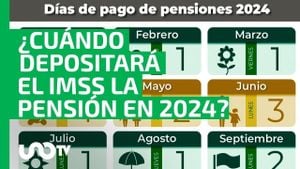Mexico is embarking on significant educational reforms as the Secretary of Education, Mario Delgado Carrillo, announced the dissolution of the Unidad del Sistema para la Carrera de las Maestras y Maestros (Usicamm) during a gathering at the Mexican Congress. This change aligns with President Claudia Sheinbaum's commitment to overhaul the current system, aiming for greater transparency and integrity within the educational sector.
The announcement, made at the start of the consultative forums scheduled until mid-March, emphasizes the need for a transparent system stripped of corruption, favoritism, and nepotism. Delgado articulated the vision of establishing a fair and equitable framework for teachers, where their roles as key players of the Fourth Transformation are recognized. "We need to construct a new system for teachers and educators based on trust, justice, and transparency," he asserted.
The decision to eliminate Usicamm is viewed as more than just symbolic; it recognizes the pivotal role teachers play as agents of social transformation and their rights as educators. Delgado stated, "The ending of Usicamm is not just simulation, it is the acknowledgment of teachers as protagonists of change." He emphasized the government's commitment to enhancing teachers' professional conditions, respecting their labor rights, and improving salaries.
This reform is not occurring within a vacuum. Political figures from both the Chamber of Deputies and the Senate have voiced their support. Senate President Gerardo Fernández Noroña underscored the necessity of educating the populace, allowing for broader access to educational resources and the promotion of equity across Mexico’s diverse communities.
The consultative forums, which run from February 25 to March 11, aim to gather input from educators, parents, students, and lawmakers across various Mexican states. These discussions are positioned as pivotal to shaping the future of the new system, which Delgado hopes will mitigate abusive practices and create supportive frameworks for teachers.
Alfonso Cepeda, Secretary General of the National Union of Education Workers (SNTE), praised the initiative allowing educators to reclaim their authority and purpose within the education system. He stated, "We are responding to the call for the construction of a new system for teachers—one of recognition, not denigration; of respect for rights, not diminishment; and of trust, not deception."
Delgado's administration aims to address longstanding criticisms of prior evaluations, which were labeled punitive, maintaining their exploitation of teachers under the previous regime. His emphasis on collaboration with stakeholders reveals the new administration's interest not only in teachers but also their students and the overall educational climate.
During the forum launch, held at San Lázaro Legislative Palace, Delgado invited varied educational authorities, including teachers, supervisors, and legislators, to contribute to dialogues aimed at shaping educational policies. The topics of discussion will revolve around transparency, evaluation of teachers' roles, and improving admission, promotion, and recognition processes.
The reforms also envision considering specific needs of indigenous populations and individuals with disabilities, ensuring inclusivity at every educational level. Delgado stated, "We are committed to maintaining the values of social equity and justice as we design and implement this new system for our educators. They must be recognized as catalysts of change, ensuring the right to education for all Mexican children and youth."
Political leaders like Ricardo Monreal Ávila, President of the Coordination Political Board of the Chamber of Deputies, also echoed the need for bipartisan cooperation to successfully legislate the reforms. He expressed his hope for consensus-building across the chambers for the benefit of educators and students alike.
Adaptive changes and innovations brought forth by the consultative forums are expected to conclude with proposals introduced to the Congress by late March, where legislators will debate and vote on necessary constitutional reforms based on stakeholder feedback. Delgado is optimistic about finalizing discussions before the close of the current legislative session, aiming for seamless transition to the new framework soon after.
With the restructuring of the educational system, Mexico aims to uplift the legal status of its educators, fortifying their capabilities and respect within the national education framework. The ambition is clear: to build a nurturing environment for teaching and learning based on mutual trust and accountability.
For Mexican educators, these changes are not merely bureaucratic shifts; they represent the dawning of a new era where their contributions are valued and recognized as integral to shaping the country's future.



